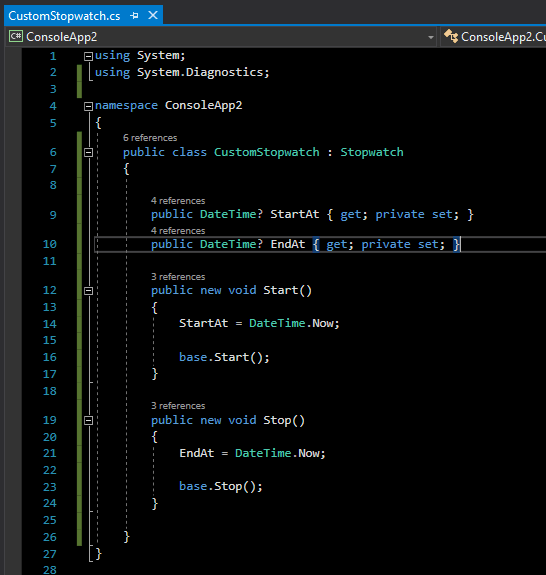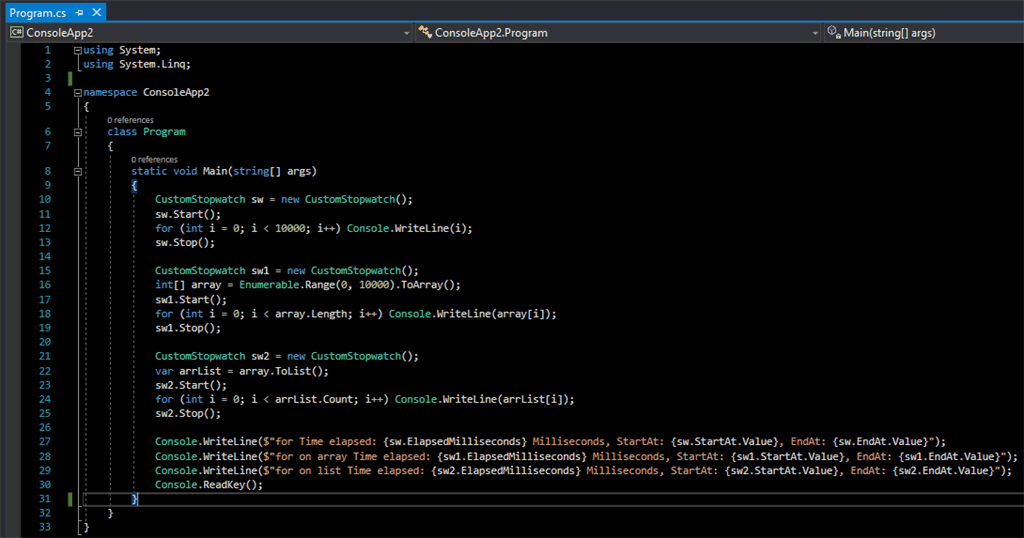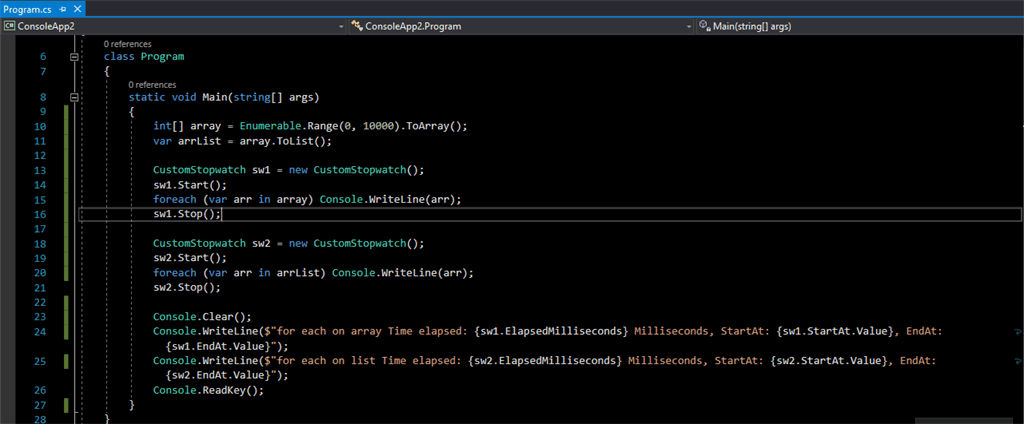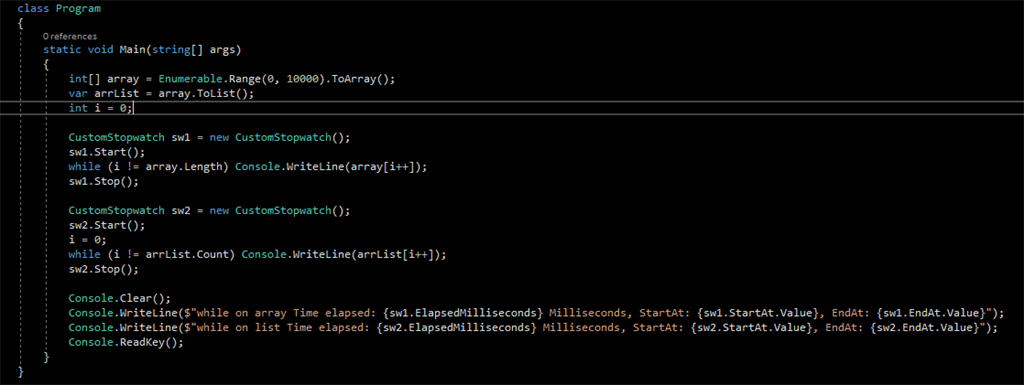实例显示C# for、foreach和while循环的速度比较
作者:admin 时间:2023-6-7 12:54:6 浏览:经常有人问“哪个循环更快?”,“哪个循环性能更高?” 等,我听说 for 循环比 foreach 循环快,但我以前从未测试过。因此,我决定看看所有循环之间的差异有多大,以及在速度和性能方面哪个在数组和列表上更快。
创建跟踪循环的类
我要找出最好的 C# 循环,为此,我将在 Visual Studio 2017 中创建一个控制台应用程序。
首先,我将创建一个名为“CustomStopwatch”的类,它有助于跟踪循环的开始和结束时间。
using System;
using System.Diagnostics;
namespace ConsoleApp2
{
public class CustomStopwatch : Stopwatch
{
public DateTime? StartAt { get; private set; }
public DateTime? EndAt { get; private set; }
public void Start()
{
StartAt = DateTime.Now;
base.Start();
}
public void Stop()
{
EndAt = DateTime.Now;
base.Stop();
}
public void Reset()
{
StartAt = null;
EndAt = null;
base.Reset();
}
public void Restart()
{
StartAt = DateTime.Now;
EndAt = null;
base.Restart();
}
}
}

现在,在 Program.cs 类中编写代码。
for循环
首先,我要实现一个 for 循环:
- 单整数(Single integer)
- 数组(Array)
- 列举(List)
using System;
using System.Linq;
namespace ConsoleApp2
{
class Program
{
static void Main(string[] args)
{
CustomStopwatch sw = new CustomStopwatch();
sw.Start();
for (int i = 0; i < 10000; i++) Console.WriteLine(i);
sw.Stop();
CustomStopwatch sw1 = new CustomStopwatch();
int[] array = Enumerable.Range(0, 10000).ToArray();
sw1.Start();
for (int i = 0; i < array.Length; i++) Console.WriteLine(array[i]);
sw1.Stop();
CustomStopwatch sw2 = new CustomStopwatch();
var arrList = array.ToList();
sw2.Start();
for (int i = 0; i < arrList.Count; i++) Console.WriteLine(arrList[i]);
sw2.Stop();
Console.WriteLine($"for Time elapsed: {sw.ElapsedMilliseconds} Milliseconds, StartAt: {sw.StartAt.Value}, EndAt: {sw.EndAt.Value}");
Console.WriteLine($"for on array Time elapsed: {sw1.ElapsedMilliseconds} Milliseconds, StartAt: {sw1.StartAt.Value}, EndAt: {sw1.EndAt.Value}");
Console.WriteLine($"for on list Time elapsed: {sw2.ElapsedMilliseconds} Milliseconds, StartAt: {sw2.StartAt.Value}, EndAt: {sw2.EndAt.Value}");
Console.ReadKey();
}
}
}
运行脚本以查看输出和执行时间(以毫秒为单位)。

根据输出,列举(List)中的 for 循环更快。
foreach循环
让我们比较列举(List)和数组(Array)上的 foreach 循环。
using System;
using System.Linq;
namespace ConsoleApp2
{
class Program
{
static void Main(string[] args)
{
int[] array = Enumerable.Range(0, 10000).ToArray();
var arrList = array.ToList();
CustomStopwatch sw1 = new CustomStopwatch();
sw1.Start();
foreach (var arr in array) Console.WriteLine(arr);
sw1.Stop();
CustomStopwatch sw2 = new CustomStopwatch();
sw2.Start();
foreach (var arr in arrList) Console.WriteLine(arr);
sw2.Stop();
Console.Clear();
Console.WriteLine($"for each on array Time elapsed: {sw1.ElapsedMilliseconds} Milliseconds, StartAt: {sw1.StartAt.Value}, EndAt: {sw1.EndAt.Value}");
Console.WriteLine($"for each on list Time elapsed: {sw2.ElapsedMilliseconds} Milliseconds, StartAt: {sw2.StartAt.Value}, EndAt: {sw2.EndAt.Value}");
Console.ReadKey();
}
}
}
运行以毫秒为单位查看输出和执行时间。

在这里,列举(List)中的 foreach 循环更快。
while循环
我们再比较列举(List)和数组(Array)上的 while 循环。
using System;
using System.Linq;
namespace ConsoleApp2
{
class Program
{
static void Main(string[] args)
{
int[] array = Enumerable.Range(0, 10000).ToArray();
var arrList = array.ToList();
CustomStopwatch sw1 = new CustomStopwatch();
sw1.Start();
int i = 0;
while (i != array.Length) Console.WriteLine(array[i++]);
sw1.Stop();
CustomStopwatch sw2 = new CustomStopwatch();
sw2.Start();
i = 0;
while (i != arrList.Count) Console.WriteLine(arrList[i++]);
sw2.Stop();
Console.Clear();
Console.WriteLine($"while on array Time elapsed: {sw1.ElapsedMilliseconds} Milliseconds, StartAt: {sw1.StartAt.Value}, EndAt: {sw1.EndAt.Value}");
Console.WriteLine($"while on list Time elapsed: {sw2.ElapsedMilliseconds} Milliseconds, StartAt: {sw2.StartAt.Value}, EndAt: {sw2.EndAt.Value}");
Console.ReadKey();
}
}
}
while 循环的输出如下。

列举(List)上的while循环更快。
对比for、foreach和while速度
最后我们对比一下for、foreach和while循环的执行时间。
| 数组(Array) | 列举(List) | |
|---|---|---|
| for | 663 ms | 472 ms |
| foreach | 3841 ms | 498 ms |
| while | 3950 ms | 460 ms |
可以看到,在数组里,for的速度是最快的,比其他的循环方法快了5倍那么多。但在列举里,各种循环方法的速度几乎无差异。
结论
本文涵盖数组(Array)和列举(List)上的 for、foreach 和 while 循环的速度比较。根据测试结果(在迭代方面),列举(List)上的循环速度更快。我认为这取决于数据和你使用数据的方式。我个人的建议是,出于以下原因,我们应该使用列表而不是数组。
- 在数组中,我们需要知道数组大小,我们不能更改数组大小,列举在创建后可以增长。
- 在列举中,我们不需要担心列举大小或索引越界异常。
- 列举提供了许多有用的方法,如添加、查找等。
- 易于阅读。
相关文章






